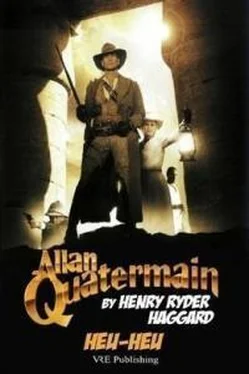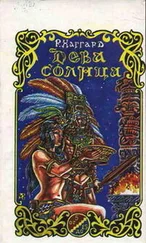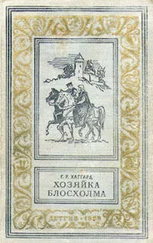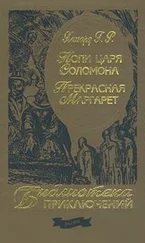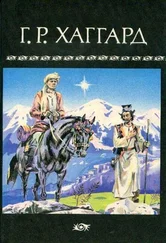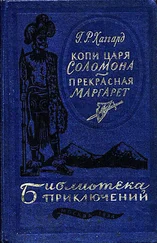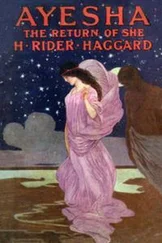"They are coming up fast, Baas, and we still have a long way to go. Soon they will catch us, Baas," said Hans.
"Then we must try to stop them for a while," I answered grimly. "Give me the Express rifle, Hans, and do you take the Winchester."
Then, lying down in the canoe and resting the rifles on its stern, we waited our opportunity. Presently we came to a place where at some time there had been a cliff–slide, for here the debris of it narrowed the river, turning it, now that it was so full, into something like a torrent. At this spot, also, because of the enlargement of the cleft, more light reached us, so that we could see our pursuers, who were about fifty yards away, not clearly indeed, but well enough for our purpose.
"Aim low and pump it into them, Hans," I said, and next instant discharged both barrels of the Express at the foremost rowers.
Hans followed suit, but, as the Winchester held five cartridges, went on firing after I had ceased.
The result was instantaneous. Some men sank down, some paddles fell into the water—I could not tell how many—and a great cry arose from the smitten or their companions. He who steered or captained the canoe from the prow apparently was among the hit. She veered round and for a while was broadside on to the current, exposing her bottom and threatening to turn over. Into this, having loaded, I sent two expanding bullets, hoping to spring a leak in her, though I was not certain if I should succeed, as the wood of these canoes is thick. I think I did, however, since even when she had got on her course again she came more slowly, and I thought that once I saw a man bailing.
On we went, making the most of the advantage that this check gave to us. But by now our men were very tired and their hands were raw from blisters, so that only the terror of death forced them to continue paddling. Indeed, at the last our progress grew very slow, and in fact was due more to the current than to our own efforts. Therefore the following canoe, which as was customary in Walloo boats of that size, probably carried spare paddle men, once more gained upon us.
Hereabouts the river wound between its cliffs so that we only got sight of it from time to time. Whenever we did so I took the Winchester and fired, no doubt inflicting some damage and checking its advance.
At length the winding ceased and we reached the last stretch, a clear run of a mile or so before the river ended in the swamp that I have described.
By this time pursuers and pursued, both of us, were going but slowly, drifting rather than paddling, since all were exhausted. Whenever I could get a sight I fired away, but still with a sullen determination and in utter silence our assailants came up, till now they were scarcely twenty paces from us, and some of them threw spears, one of which stuck in the bottom of our canoe, just missing my foot. At this spot the cliffs drew so near together at the top that I ceased shooting, as I could not see to aim, and, having no cartridges to waste, decided to keep those that remained for the emergency of the last attack.
Now we were in the ultimate reach of the river, and now at last we grounded upon the first mudbank of the swamp. Those who remained unhurt of the following Walloos made a final effort to overtake us; by the strong light that flowed from the open land beyond us I could see their glaring eyeballs and their tongues hanging from their jaws with exhaustion. I yelled an order.
"Seize everything we have and run for it!" I cried, grabbing at my rifle and such other articles as were within reach, including the remaining cartridges.
The others did likewise—I do not think that anything was left in that canoe except the paddles. Then I leapt on to the shore and ran to the right, following the edge of the swamp, the rest coming after me. Fifty yards or more away I sank down upon a little ridge from sheer exhaustion and because my cramped legs would no longer carry me, and watched to see what would happen. Indeed, I was so worn out that I felt I would rather die where I was than try to flee farther.
We grouped ourselves together, awaiting the crisis, for I thought that surely we should be attacked. But we were not. At the mudbank the pursuing Walloos ceased from their efforts. For a little while they sat dejectedly in their craft till they had recovered breath.
Then for the first time those mute hunting–hounds gave tongue, for they shouted maledictions on us, and especially on our four paddlers, the neophytes of Heu–Heu, telling these that although to follow them farther was not lawful, they would die, as Issicore died who left the land. One of our men, stung into repartee, retaliated in words to the effect that some of them had died in attempting to keep us in the land, as they would find if they counted their oarsmen.
To this obvious truth the pursuers made no answer, nor did they inform us who sent them on the chase. Securing our small canoe, they laid in it certain dead men who had fallen beneath the bullets of Hans and myself, and departed slowly up stream, towing it after them. This was the last that I saw of their handsome, fanatical faces and of their confounded country in which I went so near to death, or to becoming a prisoner for life, that might have been worse.
"Baas," said Hans, lighting his pipe, "that was a great journey and one which it will be nice to think about, now that it is over, though I wish that we had killed more of those Walloo men–stealers."
"I don't, Hans; I hated being obliged to shoot them," I answered; "nor do I wish to think any more of that race for our lives, unless it comes back in a nightmare when I can't help doing so."
"Don't you, Baas? I find such thoughts pleasant when the danger is past and we who might have been dead are alive, and the others who were alive are dead and telling the tale to Heu–Heu."
"Each to his taste; yours isn't mine," I muttered.
Hans puffed at his pipe for a while, and went on,
"It's funny, Baas, that those carles did not get out of their canoe and come to kill us with their spears. I suppose they were afraid of the rifles."
"No, Hans," I answered, "they are brave men who would not have stopped because of the bullets. They were afraid of more than these: they feared the Curse which says that those who leave their land will die and go to hell. Heu–Heu has done us a good turn there, Hans."
"Yes, Baas, no doubt he has become a Christian in the Place of Fires and is repaying good for evil, turning the other cheek, Baas. I felt like that myself when I thought those Walloos were going to catch us, but now I feel quite different. Baas, you remember how your Reverend Father used to say that if you love Heaven, Heaven looks after you and pulls you out of every kind of mudhole. That's why I'm sitting here smoking, Baas, instead of making meat for crocodiles. If it wasn't for our forgetting about those jewels, it has looked after us very well, but there are so many up there that perhaps Heaven forgot them also."
"No, Hans," I said, "Heaven remembered that if we had tried to carry bags of stones out of that boat, as well as Zikali's medicine and the rest, the Walloos would have caught us before we got away. They were quite close, Hans."
"Yes, Baas, I see, and that was very nice of Heaven. And now, Baas, I think we had better be moving. Those Walloos might forget about the curse for a little while and come back to look for us. Heaven is a queer thing, Baas. Sometimes it changes its face all of a sudden and grows angry—just like the lady Dramana did when you said that you wouldn't take her with you in the canoe yesterday."
Allan paused to help himself to a little weak whisky and water, then said in his jerky fashion,
"Well, that's the end of the story, of which I am glad, whatever you may be, for my throat is dry with talking. We got back to the wagon all right after sundry difficulties and a tiring march across the desert, and it was time we did so, for when we arrived we had only three rifle cartridges left between us. You see we were obliged to fire such a lot at the Heuheua, when they attacked us on the lake, and afterwards at those Walloos to prevent them from catching us that night. However, there were more in the wagon, and I shot four elephants with them going home. They had very large tusks, which afterwards I sold for about enough to cover the expenses of the journey."
Читать дальше
